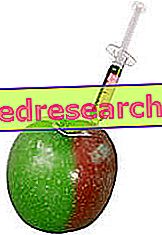Generality
Psychogenic cough is a particular type of cough whose causes are to be found in a psychological and sometimes psychiatric component .

Also known as " nervous or psychosomatic cough", the psychogenic cough manifests itself with greater incidence in young individuals.
Unlike other types of cough, psychogenic cough does not originate from disorders affecting the respiratory system, the gastrointestinal tract or the immune system; rather it represents a sort of somatization of anxious or basic nervous states; therefore, it originates from disorders affecting the psychic sphere of the individual.
What is that
What is Psychogenic Cough?
Psychogenic cough - nervous or psychosomatic, if you prefer - is a particular type of cough that is triggered by causes related to the mental and humoral state of the patient. Therefore, it is not caused by a physical problem, but represents the symptom and the somatization of emotional and mental conditions that generate states of anxiety and stress in the individual.
Psychogenic cough may occur in children, adolescents and young adults, while in older people it tends to be less frequent. However, according to some sources, nervous cough - although it also affects adults - manifests itself with greater incidence in children and adolescents aged between 4 and 15 years.
Did you know that ...
In some cases, the psychogenic cough can turn into a real nervous tic, which is an involuntary and uncontrollable reflex that occurs whenever the individual is in a state of tension. This tic disorder is generally perceived by the patient as an "irresistible" need to clear his throat or free his throat from something that seems to obstruct it.
Features
Characteristics of Psychogenic Cough
Psychogenic cough is manifested as a dry and annoying, persistent or chronic cough in which there is no production of a sputum, but simply a continuous tussive stimulus that tends to be activated in situations in which the individual is under pressure and / or uncomfortable . Generally speaking, psychogenic cough occurs only during daylight hours, or at least when the individual is awake. However, the possibility of experiencing psychogenic coughing even at night can not be completely excluded.
Causes
What are the Causes of Psychogenic Cough?
As mentioned, psychogenic cough sees its main causes in psychological disorders characterized by tensions, conditions of anxiety and stress.
Both the nervous cough and the aforementioned tic disorder characterized by coughing can be caused by:
- Tensions and states of anxiety present for a long time but never dealt with. Similar tensions and anxious states may be due, for example, to the school environment, to the family environment, to the world of work, etc.
- Malaise induced by an inability to adapt to certain conditions in the workplace, family, school, etc .;
- Anger attributable to the inability to endure certain situations considered constrictive by the individual;
- Inability to express one's anger ;
- Low self-esteem and tendency to submit to the decisions of others without being able to react and express their opinions;
- Unconscious attempts to draw attention to oneself and / or presence, always at an unconscious level, of a need to be heard .
Because of the tensions perceived by the patient, the airway muscles can contract favoring the appearance of the tussogenic stimulus, the latter is implemented by the body with the intent to "free" the airways from the obstruction in which they appear to be .
Associated pathologies
What diseases can occur in association with Psychogenic Cough?
Often, during the analysis of the patient in order to determine the cause of the psychogenic cough that afflicts him, clinical stories or the current presence of psychiatric diseases and disorders such as depressive disorders, anxiety disorders (for example, social anxiety disorder), disorders may emerge) sleep, panic attacks, etc. Clearly, in such situations, the use of targeted and specific therapies is absolutely necessary.
Diagnosis
How do you perform Psychogenic Cough Diagnosis?
The first step to make a correct diagnosis of psychogenic cough consists in excluding the presence of any other physical causes that could give rise to the symptom in question.
It is not unusual, in fact, that the patients themselves "label" their own cough or that of their children as "nervous", because they are unable to identify a potential cause. In this regard, we recall that the diagnosis can and must be placed only and exclusively by the doctor, who must ensure that the annoying dry cough that lasts for weeks, months or years is not due to other factors, such as:
- Pre-clinical conditions of bronchial asthma;
- Chronic laryngitis;
- Neoplastic disorders (lung cancer, bronchus tumor, etc.);
- Gastroesophageal reflux disease (reflux cough);
- Cardiac disorders;
- Allergies (allergic cough).
Clearly, the doctor must be made aware of all the characteristics of the cough that afflicts the patient (type of cough - fat or dry, moments of the day in which it appears, possible onset of night attacks, etc.). As mentioned, the psychogenic cough is dry, sometimes irritating and, in most cases, afflicts the individual during daylight hours or in any case during waking hours.
Once all the necessary data have been collected, after having subjected the patient to a thorough examination, analysis and tests and having ruled out the presence of any of the aforementioned potential organic causes of coughing, the doctor is generally able to establish whether what afflicts the patient is a psychogenic cough. At the same time, as part of the diagnosis, the doctor must be able to identify the presence of any other psychiatric disorders or diseases that may have given rise to the symptom of cough or that may have developed as a result of the illness that initially caused the psychogenic tussogenic reflex.
Care and Treatment
What Cures and Treatments Are Available Against Psychogenic Cough?
To counter the psychogenic cough it is necessary to act on the psychological causes that triggered the symptom in question.
In less severe situations, where there is no real pathological component, to eliminate - or at least limit as much as possible - the psychogenic cough, it may be useful to resort to learning and the consequent practice of relaxation techniques such as exercises breathing and meditation.
In the most severe cases, however, in which the psychological component that gives rise to the nervous cough hides or evolves towards a true pathological form, the intervention of the doctor is absolutely necessary and, even better, of specialized figures in this field, which are the psychologist and the psychotherapist.
In addition to supportive psychological therapy, in some cases it may also be necessary to resort to pharmacological treatment based on anxiolytic or antidepressant drugs, depending on the case.
Contrary to what one might think, symptomatic treatment with sedative cough drugs is not effective in eliminating psychogenic cough, therefore, similar medicines should be avoided.
In any case, the specialist will decide, case by case, which therapeutic strategy is best to undertake to eliminate the psychogenic cough and its triggering cause in each patient.



